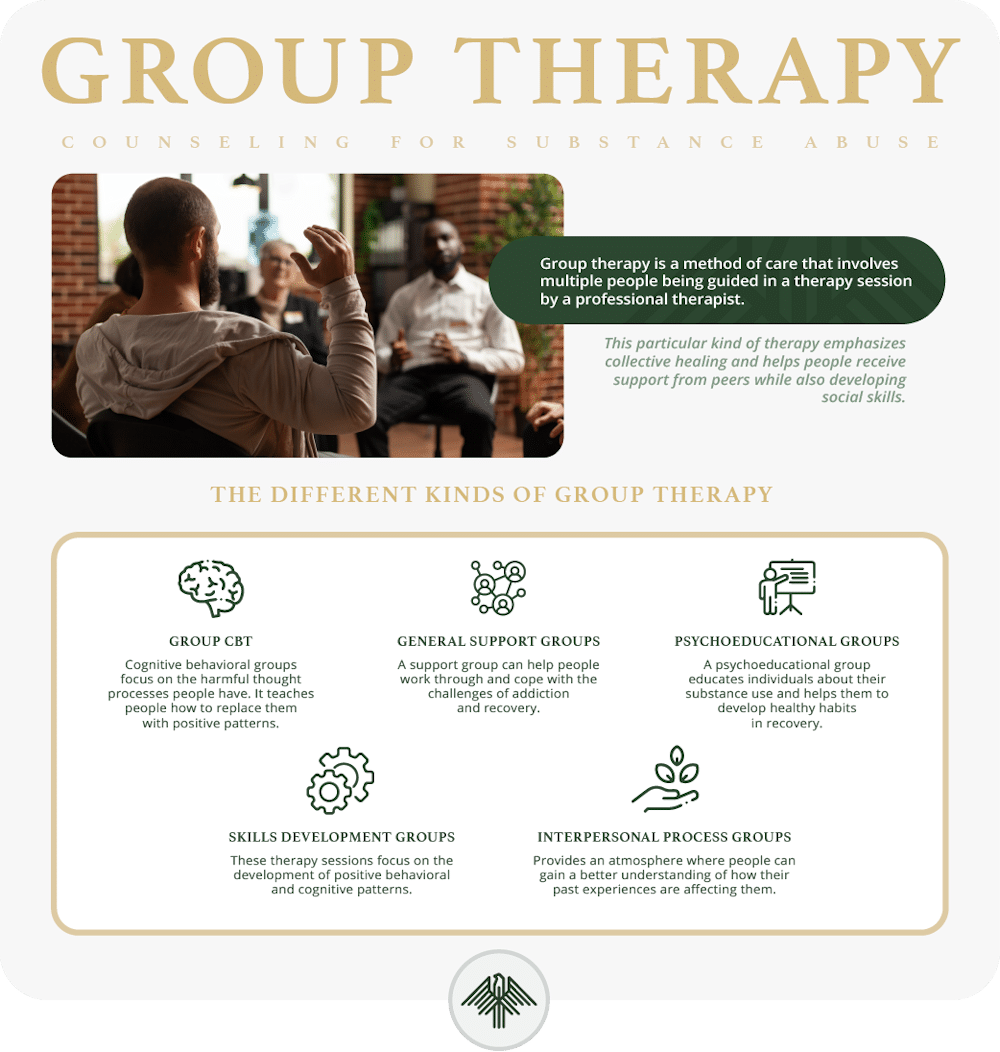Group Therapy for Substance Abuse

In many cases of substance abuse and mental health concerns, particularly for those who suffer from uncontrollable compulsions, severe bouts of depression, and other behavioral or psychological issues, the best way to approach it usually includes support. This is where addiction therapy comes in. Group therapy for substance abuse is especially helpful.
Support is also one of the central pillars of most group therapy programs. It capitalizes on a setting where someone needing support will be among people they feel comfortable with, allowing them to respond better to therapy and open up more easily.
What is Group Therapy?
Group therapy is a type of addiction counseling that occurs in a group setting. Group therapy sessions typically involve several group members and one or more mental health professionals who serve as group leaders. While in group therapy for substance abuse, people can communicate with others who are in recovery. They can learn more about the recovery process and maintain accountability to other group members.
Types of Group Therapy for Addiction Treatment

Group therapy for substance abuse comes in various forms. Group therapy models offer their own set of benefits and can be helpful when used in combination with other substance abuse treatment programs. Some of the types of group therapy for substance abuse include the following:
- Group cognitive behavioral therapy
- General support groups
- Psychoeducational groups
- Skills development groups
- Interpersonal process groups
Again, each of these group therapies for addiction can be beneficial to those in drug and alcohol treatment. Learning more about these types of group therapy can help people who are seeking addiction treatment.
Cognitive behavioral groups focus on the harmful thought processes people have. It teaches people how to replace them with positive patterns. These group sessions can facilitate relapse prevention training.
A support group can help people work through and cope with the challenges of addiction and recovery. Support groups can also help individuals cope with other challenges, such as grief, job loss, financial problems, and more. These challenges can be triggers, which can lead to mental or physical relapse. However, with the support of other group members, people can remain on track.
Psychoeducational groups can help equip people with coping skills and strategies. A psychoeducational group educates individuals about their substance use and helps them to develop healthy habits in recovery.
This type of group therapy helps improve the skills people need as they recover from addiction. These therapy sessions focus on the development of positive behavioral and cognitive patterns.
This type of therapy helps the members of the group process their feelings. It provides an atmosphere where people can gain a better understanding of how their past experiences are currently affecting them. This type of therapy can also help people develop interpersonal skills.
Contact Eagle Creek Ranch
Recovery Today!
Why Wait? Find The Help You Need By Reaching Out To Us Today! Our Admissions Team Is Standing By.
What Can Group Therapy Help With?
Group therapy for substance abuse can support people in dealing with a variety of psychological and behavioral health challenges. While individual therapy offers a private and convenient solution, the entire premise of group counseling is to help people lead a normal life again. “Normal life” involves socializing, interacting, and communicating with others.
Group therapy for addiction allows those receiving treatment to transition back to interacting and communicating well with others. Some of the conditions where group therapy is quite effective treatment include:
- Mental health disorders
- Alcohol addiction
- Drug addiction
Group therapy for substance abuse can play a vital role in mental health and substance misuse treatment. In many cases, group therapy can be one of the most necessary and critical components of the recovery process.
Many people who have substance use disorders also have co-occurring mental health disorders. As a result, these individuals typically require professional dual diagnosis treatment. Fortunately, addiction treatment centers that offer group therapy can help in this area. Those who are living with mental health disorders can receive the support they need while in group therapy.
Alcoholism is a serious substance use disorder that affects many people all over the globe. Unfortunately, countless people have found themselves struggling to overcome alcohol use disorders. However, professional alcohol treatment programs can assist those who are suffering from alcoholism.
Group therapy is often a major part of alcohol abuse rehabilitation. Those who are recovering from alcoholism can learn more about the journey from other group members. They can also be a positive part of others’ recovery journeys.
When it comes to the drug addiction treatment process, counseling is invaluable. Group therapy can help people to learn more about what causes drug addiction to develop in their lives. A therapy group can also provide more education about how to avoid relapse and remain on the road to recovery.
Group therapy can be beneficial to those who are recovering from the following types of drug addiction:
- Heroin addiction
- Cocaine addiction
- Prescription drug abuse
- Meth addiction
Group therapy can address drug use problems in a way that other types of therapy simply cannot.
WHAT ARE THE BENEFITS OF GROUP THERAPY?
Psychotherapy is always a complex thing, as one form might work well for some but become more of a hazard to others if they don’t resonate with the particular type. This is why there are several psychotherapy approaches used during treatment. Individual therapy can be beneficial for certain reasons. Group therapy is helpful for other reasons.
But often, both approaches are necessary for healing. Should the particular type of therapy be well-suited to the patient, progress, and breakthroughs could be achieved. If not, the therapy could make things worse for the patient who needs it.
In any case, the advantages of therapy groups can not be overstated. The benefits of group therapy include the following:
Humans are social creatures. Even for introverts, knowing that there is someone to help during a time of need is far better than suffering alone. This is the atmosphere group therapy offers, as it provides a sense of community and security for those who are in a vulnerable position because of their particular issue.
Once a person feels they are in a safe environment with people who are not likely to judge them or make things worse, they are more likely to be receptive to communication and interaction.
Being in a group therapy setting, where one can speak freely and share what they feel without fear of criticism or judgment, will give the patient the voice they always needed. With this voice, individuals can speak up about their struggles.
While individual therapy can help people focus on the underlying causes of addiction, group treatment settings enable people to see that they aren’t alone in their struggles. Knowing that others are going through the same thing may make people feel better because it gives them hope for recovery. Hope can give people the ability to endure whatever it is they are carrying for a bit longer, until the rest of the therapy helps them deal with it completely.
Group therapy gives the chance to socialize and interact with others. It removes the burden of isolation and allows proving to the patient that they are not as much of a threat to others as they might think.
While in group therapy for addiction, individuals can develop healthy coping skills that will help them to deal with triggers and issues moving forward. It can be difficult to stay on track during and after substance abuse treatment, especially when people are learning to address their challenges without resorting to alcohol or drug use or related behaviors.
But with help from a supportive environment like group therapy for addiction, people can gain coping skills that allow them to properly deal with the obstacles and challenges they may face.
In life skills development groups (and other types of group therapy), people can develop life skills that will help them to stay on track when they complete treatment and get back into life outside of rehab. Skills such as communication and social skills, critical thinking, problem-solving, creative thinking, and decision-making can all be developed through group therapy.
RECEIVE SUBSTANCE ABUSE TREATMENT AT EAGLE CREEK RANCH
If you are searching for addiction and mental health services in Idaho, reach out to Eagle Creek Ranch today. As your treatment provider, our primary focus is your health. We strive to provide a life-changing addiction treatment experience for you.
You can attend group therapy sessions here at our Idaho rehab center. By being a part of a therapy group here at Eagle Creek Ranch, you can work through the challenges of early recovery and prepare for a life free from addiction. Through our comprehensive treatment practices and therapy groups, you can overcome addiction for good. We also offer individual therapy, family therapy, CBT, motivational interviewing, DBT, and more.
Find freedom from addiction. Allow Eagle Creek Ranch to help you end your struggle with substance use disorder, once and for all. Contact us today to learn how we can assist you.

Clinical Director
Kendall Maloof is the clinical director at Eagle Creek Ranch Recovery. She is a licensed marriage and family therapist and has held multiple leadership roles before settling here at Eagle Creek. Kendall received her master’s degree in marriage and family therapy from the Chicago School of Professional Psychology in 2016. Her career in mental and behavioral health began in 2014 when she took up internships in both the nonprofit and for profit sectors. She interned at multiple reputable companies, such as The Living Success Center and 449 Recovery in California.
In 2019, Kendall became the clinical director of Sunsets Recovery for Woman, a dual diagnosis program in southern California. Kendall is a natural leader. She has an incredible ability to problem solve and stay calm in any situation. Kendall never fails to show up when she is needed, and her calm demeanor makes her team and clients feel at ease. Eagle Creek Ranch Recovery is proud to have Kendall as our clinical director.



